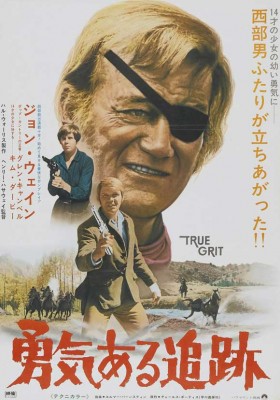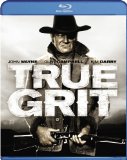| Reviews & Columns |
|
Reviews DVD TV on DVD Blu-ray 4K UHD International DVDs In Theaters Reviews by Studio Video Games Features Collector Series DVDs Easter Egg Database Interviews DVD Talk Radio Feature Articles Columns Anime Talk DVD Savant Horror DVDs The M.O.D. Squad Art House HD Talk Silent DVD
|
DVD Talk Forum |
|
|
| Resources |
|
DVD Price Search Customer Service #'s RCE Info Links |
|
Columns
|
|
|
True Grit (1969)
In fact the movie is above average when compared to the 15 other films he starred in during the last ten years of his career. It's far superior to, say, The Green Berets (1968) or McQ (1974), but not significantly worse than El Dorodo (1967) or Chisum (1970), and arguably not as good as the thematically similar The Cowboys (1972) or The Shootist (1976), Wayne's last and one of his most personal. Even True Grit's sequel, Rooster Cogburn (1975), is pretty good even if it's basically The African Queen in the Old West.
But True Grit has a lot going for it, despite some major drawbacks. Closely adapted from Charles Portis's 1968 novel of the same name, the screenplay by former blacklisted (and female) writer Marguerite Roberts, whose grandfather was a 19th century sheriff in untamed Colorado and who knew who to write tough action films, wisely retained the film's period language and other authentic observations. On the down side is the casting of singer Glen Campbell in his film debut; he's simply not a good actor and not for a part this important. Kim Darby, third-billed but really the main character as Mattie Ross, an assertive 14-year-old determined to kill the man who murdered her too-trusting father, is a better actress but reportedly was extraordinarily difficult to work with. The end result is that she gives a fine performance, but one lacking the strong emotional bond needed between Mattie and Wayne's Rooster Cogburn.
Paramount's Blu-ray presents an excellent transfer but 100% recycled extra features. However, the high-def transfer is a real knockout and definitely worth an upgrade.
The story builds slowly with headstrong 14-year-old Mattie (Darby), mature for her years and the family farm's accountant, initially plans only to claim her murdered father's body in a nearby city. But her hatred for Tom Cheney (Jeff Corey), the farmhand her Daddy generously hired when Cheney was starving only to have him turn against his employer and murder him in a drunken argument, leads Mattie to seek the services of one-eyed U.S. Marshal Reuben "Rooster" J. Cogburn (Wayne), the most ornery of lawmen. Though initially unimpressed by Mattie's determination and professionalism, her ability to raise cash to hire him does, and word that Cheney may be traveling with a more valuable outlaw, "Lucky" Ned Pepper (Robert Duvall), a gunfighter Rooster himself once nicked in the lip, is an added incentive.
A young Texas Ranger, calling himself La Boeuf (Campbell), himself looking for Cheney after he killed a minor Texas senator, cuts himself into Rooster's deal, but Le Boeuf wants no part of Mattie. The two men try to lose her on the trail, but her ability to keep pace gradually wins them over.
True Grit is a strange animal, made by old hands - seventy-one-year-old director Henry Hathaway, same-aged producer Hal Wallis, sixty-two-year-old Wayne - but it's also infused with younger talent like Duvall and, in a memorable small part, Dennis Hopper, the same year he starred and directed Easy Rider. (Mild Spoilers) Hopper's gruesomely violent murder/death scene is quite shocking - the film was rated "M" originally but, incredibly, re-rated "G" - not the kind of thing you'd have seen in a Western even five years before.
In keeping with the novel, the dialogue, which sounds artificial and overly stylized to modern ears, rings with period authenticity. Consider this monologue by Rooster discussing an ex-wife:
"I didn't have her long. My friends was a pack of river rats and she didn't crave their society so she up and left me and went back to her first husband who was clerkin' in a hardware store in Paducah. "Goodbye, Reuben," she says, "the love of decency does not abide in you!" That's a dee-vorced woman talkin' for you, about decency. Well, I told her. I said, "Goodbye, Nola, and I hope that nail-sellin' bastard makes you happy this time!"
When Mattie asks if they ever had children Rooster replies, "There was a boy. Nola taken him with her. He never liked me anyway. A clumsier child you'll never see than Horace; I bet he broke 40 cup." Wayne himself treasured that scene as one of the best of his entire career.
Already bigger than life, Wayne plays Rooster broadly, as the character demands. He's a joy to watch, not so far from his familiar persona to be unrecognizable but far removed from the usual "John Wayne character," too. I think he could have toned it down a notch or two even more, but few begrudged his Best Actor Oscar.
Portis's dialogue permeates the film. It only further hampers Glen Campbell's unsteady performance, but it plays almost deliriously well in other scenes. Strother Martin has two wonderful moments with Kim Darby over the disposition of her father's belongings and the sale of a gelding. He smugly thinks he has the 14-year-old over a barrel but she tenaciously negotiates him down and doesn't flinch at his growing irritation. In an earlier, simpler, but equally expressive scene she irritates a boarding house landlady over the price of the cheap meal she proudly boasts of. Darby's fine in these scenes but there's a warmth not entirely there with Wayne and a hardened edge to the character that's lacking. (I kept thinking how great an actress like Linda "Days of Heaven" Manz would be.)
The film has a delicacy and authenticity that was beginning to creep into some of the best movie Westerns, and while it doesn't have the James Edward Grant-esque sledgehammer clichés (and barroom brawls) of many earlier Wayne films, the influence of a proven formula is present. Campbell's appearance, for instance, reflects a long line of popular singers in the juvenile leading role, a practice dating back to pop stars like Ricky Nelson in Rio Bravo (1959). Other sequences, like the carnival atmosphere surrounding a public hanging in a civilized corner of the West, where vendors sell bags of peanuts and children play on swings while waiting for the Big Drop, are likewise unique and interesting.
The rest of the cast and the technical credits are top-notch. Jeff Corey is particularly good as the ruthless Cheney. John Doucette (low-key as the sheriff) and an uncredited Hank Worden (as the sensitive undertaker) are fine in their one-scene parts, and the film has a memorable score by Elmer Bernstein.
Video & Audio
Filmed for 1.85:1 cropping, True Grit has always played better on TV and home video than most Wayne Westerns; I wasn't expecting a big leap quality-wise but I sure got one. The opening titles, in rich red font, almost look 3-D they pop off the screen so. The colors are truer, and the added high-def clarity really makes a different both in terms of the studio interiors, where one can appreciate the detailed set design and decoration, and exteriors, where the beauty of the locations where stands out. There's a lot of thick foliage in the film, which the Blu-ray reads far better than the previously released DVD. While the original theatrical mono mixed is included, I recommend the DTS-HD Master Audio 5.1 track, which brings out Bernstein's score better and captures the ambient noise better without trying to mix it in 2011 terms. Mono tracks in French, Spanish, and Portuguese are included, as well as subtitle options in all those languages as well.
Extra Features
Extras are identical to the earlier DVD version, though the trailer here is in high-definition, if a little dog-eared. Included is the previously available audio commentary track, a good one, with historians Jeb Rosebrook, Bob Boze Bell, and J. Stuart Rosebrook; and short featurettes: "True Writing" "Working with the Duke," "Aspen Gold: The Locations of 'True Grit,'" and "The Law and the Lawless." All of these are in standard-def.
Parting Thoughts
True Grit is a fine film, and a decent if not typical introduction to the career of the great John Wayne, whose status as one of the all-time great film stars hasn't diminished a bit in the three decades since his death. Highly Recommended.
Stuart Galbraith IV's latest audio commentary, for AnimEigo's Musashi Miyamoto DVD boxed set, is on sale now.
|
| Popular Reviews |
| Sponsored Links |
|
|
| Sponsored Links |
|
|
| Release List | Reviews | Shop | Newsletter | Forum | DVD Giveaways | Blu-Ray | Advertise |
|
Copyright 2024 DVDTalk.com All Rights Reserved. Legal Info, Privacy Policy, Terms of Use,
Manage Preferences,
Your Privacy Choices | |||||||














